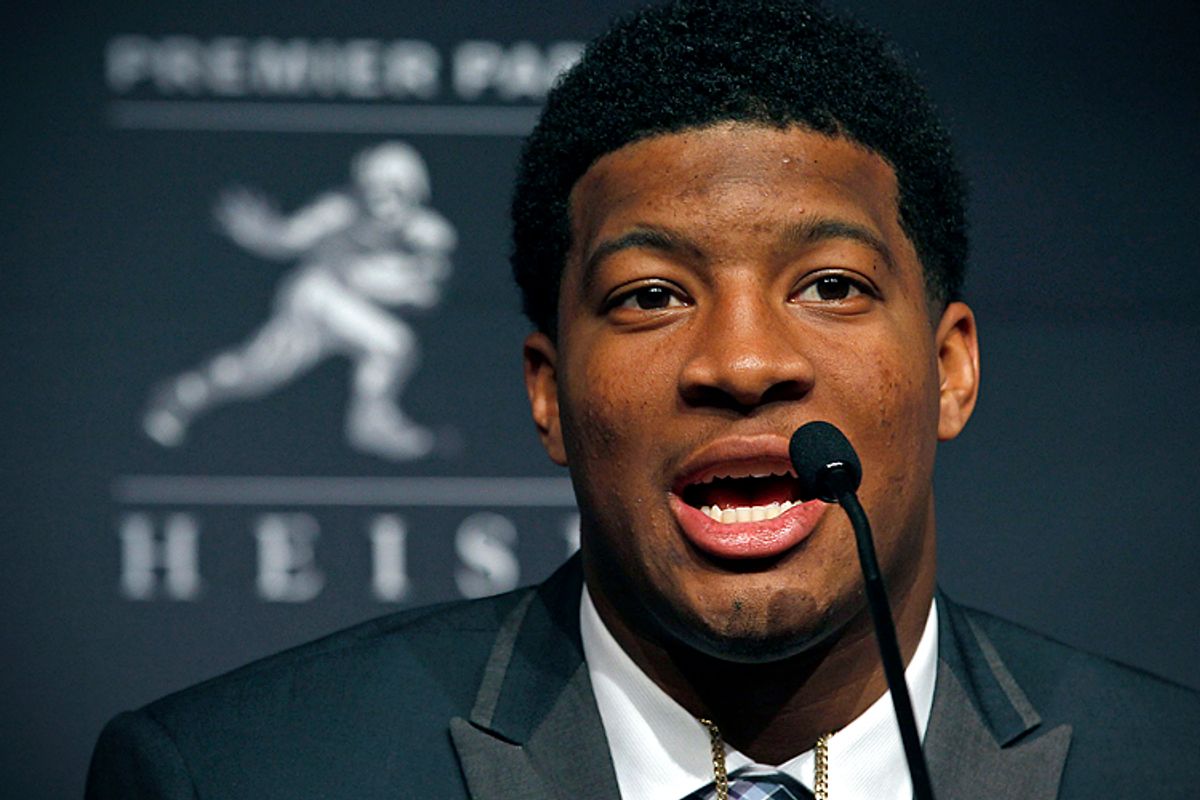A quick and incomplete list of how the Tallahassee Police Department botched the Jameis Winston rape investigation:
- Police did not retrieve surveillance footage from the bar where Winston was last seen with his accuser and other witnesses before the alleged incident; by the time the prosecutor's office got around to it -- 11 months later -- the tapes had been erased
- Police did not contact another football player who took video of the sexual encounter, video that was later deleted
- Police waited two weeks to contact Winston -- by phone -- and did not pursue the matter further when Winston declined to be interviewed
- Police did not obtain DNA samples from Winston because Winston said doing so would "create publicity"
- Police warned the woman's attorney that her life would be "made miserable" if she followed through with charges against Winston because, "Tallahassee was a big football town"
- The case did not go to the prosecutor's office until nearly a year after the incident, by which time most of the evidence in the case had been destroyed
And here's prosecutor Willie Meggs on his assessment of police conduct during the investigation: "They just missed all the basic fundamental stuff that you are supposed to do."
The Winston case is closed. He was never charged. He would go on to win the Heisman Trophy a week later, and have another star moment with Florida State's baseball team after football season ended.
But the entire shameful ordeal may have provoked at least one positive outcome: the Tallahassee Police Department is in the process of reviewing its sexual assault policies, and aims to revise them to avoid repeating these egregious and negligent errors.
From the New York Times:
[Tallahassee Police Chief Michael] DeLeo said in an interview that his department was working on its sexual assault complaint policy with the advocacy group End Violence Against Women International. “They’re looking at our procedures, how we document things, to make them better,” he said.
The chief did not offer a timetable as to when recommendations might be carried out. “We completely review them until we’re all comfortable with it,” he said.
At a community forum organized by Ms. Baldwin on Wednesday, major players in the local criminal justice system, including Chief DeLeo; William N. Meggs, the state attorney who investigated the Winston case; and Florida State’s police chief, David Perry, heard experts on sex crime investigations emphasize the importance of prosecuting sexual assaults based on the evidence, not the likelihood of conviction.
[Executive director of the Refuge House, a service provider for victims of sexual assault Meg] Baldwin said that among those women in the area who had reported assaults to local law enforcement, most became discouraged with the process. Only 20 percent of sexual assaults reported to the prosecutor’s office resulted in arrests, charges and trial or plea, she said.
This is hardly a problem isolated to Tallahassee or the Winston case. Last year, an extensive national survey on sexual assault confirmed -- as so many other reports already have -- that rape and sexual assault are grossly underreported in the United States, and that law enforcement agencies are often poorly equipped and inadequately trained to properly document these cases and support victims.
According to the research from the National Research Council, one of the problems fueling the mishandling of these cases by law enforcement is a fundamental misunderstanding of sexual assault in this country. Police protocol is often designed around "stranger rape," when in fact a majority of victims know their perpetrator. Likewise, investigations tend to look for physical evidence -- in the form of bruises or weapons -- when in many cases such things never materialize. Often, the injury is the rape itself. Left with only that, police reduce the matter to a "he said/she said" debate over the nature of sex and consent. And when that's how these cases break down, "he said" overwhelmingly wins out.

Shares